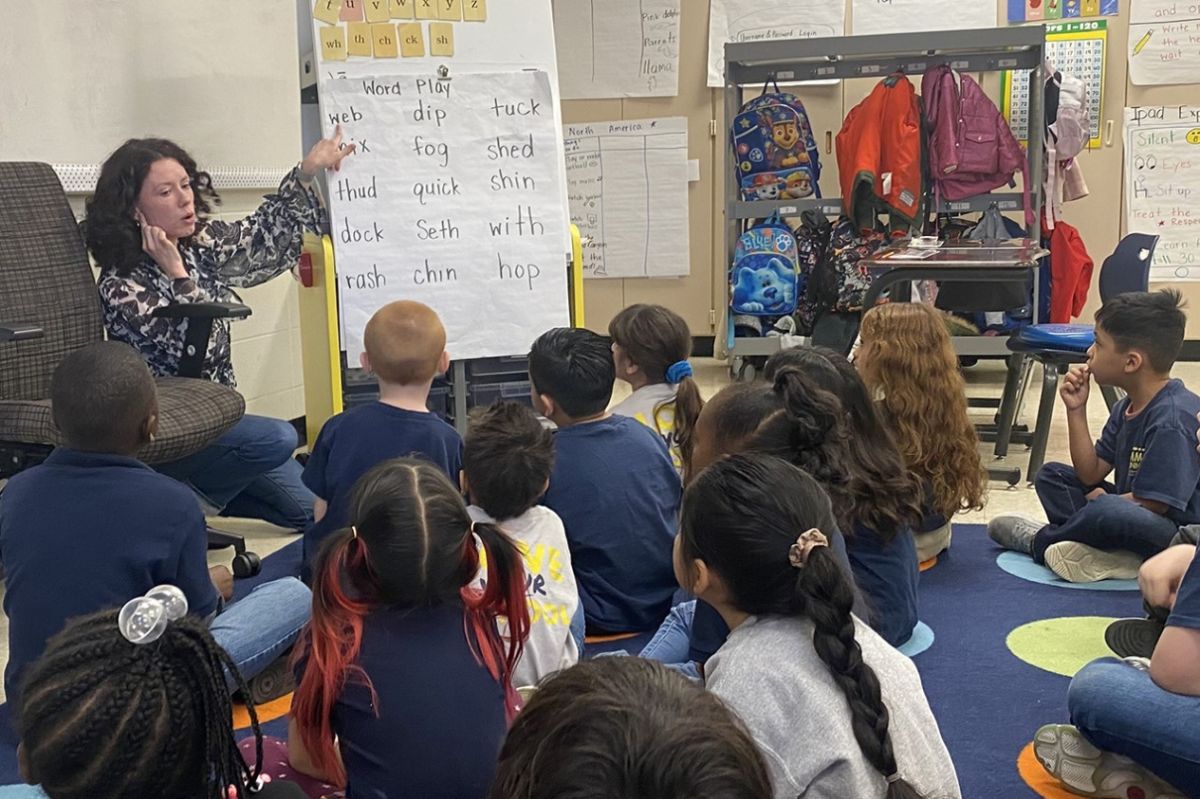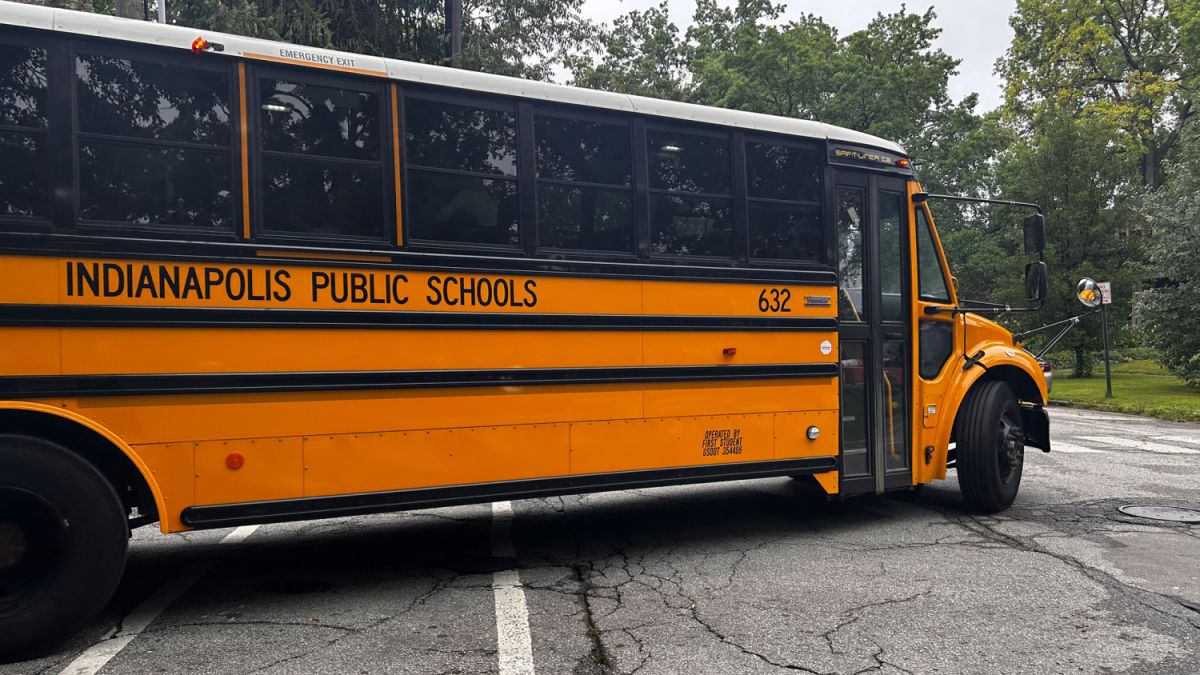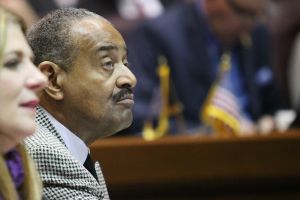
Teacher Ivy Sullivan works on reading skills with kindergarten students at Adelante charter school on Thursday, April 27, 2023 in Indianapolis. (Elizabeth Gabriel)
The Indiana General Assembly is weeks into the 2025 legislative session, with more than 30 bills that could reshape the state’s K-12 education system.
Proposals range from universal vouchers to school district closures and changes to charter school funding.
Lawmakers will pass a two-year budget during the roughly three-month session while navigating directives from a new leader — Republican Gov. Mike Braun. His plans are already taking shape at the Statehouse, as Senate Republican leaders have named property tax reform— which could impact schools— as their top priority.
Education bills and policy proposals are beginning to stack up. This year, House Republicans appear to be leading efforts to revise the state’s education laws, following the Senate’s 2024 focus on truancy.
All proposed bills have been filed, and the deadline for legislation to pass out of its original chamber is Feb. 20.
Here are 13 education-related bills to watch this session.
Republicans to expand universal vouchers to private schools
House Bill 1001 would establish universal school vouchers, allowing any Indiana family to use state funds to attend private, parochial, or nonreligious schools through the Choice Scholarship Program.
A universal system is projected to cost more than $88 million in fiscal year 2026 and more than $94 million in fiscal year 2027, according to projected numbers from the nonpartisan Legislative Services Agency.
LSA projects another $86,000 for the state's Department of Education to expand and oversee the program.
The cost is relatively minimal when compared to previous rollbacks to income eligibility and other requirements that expanded eligibility.
During the last school year, the state hit a record and paid $439 million in tuition vouchers to private parochial and non-religious schools. The 2023 expansion was projected to cost the state $1.136 billion over two years.
There’s also increased appropriations for Education Savings Accounts and Career Scholarship Accounts — a program for students with disabilities that can be used for tuition to non-public schools and tutor services. The program is only open to families who leave the public school system.
Braun proposed $11 million for CSAs and $25 million for ESAs in each year of the budget, a jump for both from the previous budget. Those figures are reflected in the House’s budget proposal.
There are two bills brought forward by Senate Democrats to build rules and transparency for school choice options – Senate Bill 320 and 403.
Changes to property taxes could impact funding for schools
Senate Bill 1, authored by Sen. Travis Holdman (R-Markle), would seek property tax relief in a number of ways, including a cap on property tax increases.
The governor is asking to give tax relief in other places, like phasing out the tax on retirement income over four years.
Property tax reform – wherever it lands after months of debates – could greatly affect local government and schools. School corporations could lose up to $1.91 billion over the next three fiscal years, according to a state estimate.
This comes as tuition support for all publicly funded schools — traditional, charter and vouchers for private schools included — is down, according to data from the nonpartisan Legislative Services Agency.
House Minority Leader Phil GiaQuinta (D-Fort Wayne) called on lawmakers to fund public schools amid property tax reform.
“Our public schools are the lifeblood of our communities and we need to treat them as such with responsible investment,” GiaQuinta said during his agenda speech. “We can take the pressure off property taxes and increase state funding to public schools.”

Transportation sharing in Marion County, Gary and other school districts
Student transportation and management of facilities could soon be out of the hands of Indianapolis Public Schools leaders and four other districts if House Bill 1501 is passed.
The legislation, authored by Rep. Bob Behning (R-Indianapolis), would establish a three-year pilot program for the districts and create a centralized school facilities board and a student transportation board because less than 50% of students within the districts’ boundaries attend schools operated by the school district.
The affected school districts would have no say in who sits on the boards. Following the pilot years from 2026 to 2029, the boards could then begin imposing property taxes for facilities and transportation services.
The other districts include Gary Community Schools, Tri-Township Consolidated Schools in LaPorte County, Union Schools southeast of Muncie, and Cannelton City Schools in Perry County.
A combined transportation center would allow Marion County school districts, charter schools and possibly private schools to share resources and routes when carting students to school.
The education department released a state-required report on the feasibility of transportation sharing, among other ideas.
In the report, IDOE offered up suggestions for a potential pilot program, including allowing school districts to establish a centralized transportation authority that would oversee school transportation in a specific geographic area.
Secretary Jenner told WFYI in December that shifts to transportation should start with a pilot program.
“The one thing that I will remain strong on is, I believe initially it should be a pilot,” Jenner said. “We have many school districts who are in schools who are trying to be as efficient as possible with transport.”
Rise Indy, a local group who aims to address equity issues for all students in the city, surveyed families in October about transportation in Marion County. The group says more than 80% of respondents supported the idea of transportation sharing.
Legislation would dissolve IPS, Gary, 3 other school districts
House Bill 1136, authored by Rep. Jake Teshka (R-North Liberty), proposes converting 50 schools in the Indianapolis Public Schools district into charter schools due to enrollment shifts.
The same four other school districts targeted in House Bill 1501 would also be disbanded under the legislation: Gary Community Schools, Tri-Township Consolidated Schools, Union Schools, and Cannelton City Schools.
The bill states that if more than 50% of students residing within a school district’s boundaries were enrolled in schools not operated by the district as of Oct. 1 of the previous year, the district must be dissolved.
Traditional public school advocates sounded alarms across the state. The uproar around the bill has slowed because it has yet to be brought to the House education committee, where lawmakers can debate the future of these schools.
Those who are opposed to it, say it targets marginalized groups. Teshka said targeting those areas and groups is “somewhat incidental.”
“We're looking at school districts where folks are moving away, and presumably, because there are issues with those, those districts,” Teshka said.
Challenges to diversity, equity and inclusion
Senate Bill 289 would ban schools from compelling students to adopt or adhere to certain beliefs, and from hiring outside contractors to promote certain beliefs, and prohibits the endorsement of stereotypes.
It also bars schools from blaming students for historical actions committed by members of the same race, sex, ethnicity, religious or national origin.
A history teacher could not be required to say that systemic racism has shaped modern institutions. The teacher could instruct about historical facts but not share a viewpoint about their significance.
And the bill would require school corporations and charter schools to publicly post certain training and curricula materials regarding diversity, equity, inclusion, race, ethnicity, sex and bias on their websites.
Byrne said the bill prohibits discrimination and builds transparency.
“Instead, people should be respected based on their own unique character characteristics, life skills and experiences,” Byrne told the Senate Judiciary Committee on Jan. 22.
Byrne cited the “Eyes on Education” portal – platformed by Attorney General Todd Rokita to allow anyone to report curricula on race and gender — as an example of why his bill is needed.
Senate Bill 235 goes even further, banning state agencies, public universities, and contractors receiving state funds from requiring participation in DEI programs. It also prohibits the promotion of certain concepts, including bias, antiracism, social justice, and gender ideology.
Teacher literacy training hours cut in half
Sen. Jean Leising (R-Oldenburg) filed Senate Bill 34 to reduce how many hours teachers are required to complete for the state’s new literacy training, plus it would ax the written exam.
Under her bill, teachers would only have to complete 40 hours to finish their endorsement, which is needed to renew their licenses. This latest bill would also remove the certification exam Praxis for teachers seeking a license renewal.
The new literacy requirements were set by state law in 2023 to address quickly declining reading scores. The rules were tweaked in the 2024 session to ensure that targeted teachers renewing their license must also be trained in the science of reading.
The initial rollout of this endorsement caused quite a stir amongst teachers, many took issue with its requirements for longtime, veteran educators.
The state’s largest teachers union took issue with this endorsement requiring a passing grade on the Praxis exam, arguing it's a barrier for educators. In December, Jenner said more than 92% of teachers who took the exam for the endorsement, passed.
House Republicans want to rewrite the state’s education laws
House Republicans are looking to repeal and rewrite parts of Title 20, which is the bulk of the state’s education laws through House Bill 1002.
The goal of stripping it back, legislation author Rep. Behning said, is to take some of the directives off schools and districts. Behning believes changes will take at least three years.
But some of the provisions in the legislation are already catching heat.
The bill reduces some of the requirements for the Secretary of Education, which is appointed by the governor. The bill would allow the governor to select anyone they deem worthy of the role.
Currently, education law lists off rules for the appointee, like educational experience, candidates must have earned an advanced degree preferably in education and be employed as a teacher, principal or superintendent at the time of appointment.
The bill also cuts the timeline required for notifying families if bus transportation is terminated from three years to one year, among many changes proposed in the 135 pages of the legislation.
Chronic absenteeism
House Bill 1201 builds on some of the state’s new truancy law, which requires schools to report when students miss more than 10 days of school.
The bill prohibits schools from expelling or suspending students solely for being chronically absent or habitually truant.
Behning, the bill’s author, told WFYI in December that chronic absenteeism would be addressed but not a top priority due to the 2023 legislation. There’s similar legislation being proposed in the Senate.
It would task the state’s education department with asking schools how they distinguish between an excused and an unexcused absence to prepare a report on the subject for lawmakers. The amended bill goes further to require schools to gather annual data on absences broken down by gender, race, grade level and other factors.
The bill also addresses attendance by requiring the Indiana Education Department to create a list of best practices for reducing absenteeism. It also directs the department to study how schools decide whether to categorize absences as excused or unexcused.
Other bills to watch:
- Senate Bill 8: Limits school districts to placing referendums on ballots only during general elections and requires more detailed ballot language on property tax impacts.
- Senate Bill 146: Raises Indiana’s minimum teacher salary from $40,000 to $45,000. Some Senate Democrats are pushing for a higher increase.
- House Bill 1640: Expands the On My Way Pre-K program to all four-year-olds, eliminating family income and employment requirements.
- House Bill 1498: Modifies the state’s A-F school accountability framework, allowing a new grading system to be implemented by the end of 2025. And it calls for null school letter grades to continue through the 2024-25 school year.
Rachel Fradette is the WFYI Statehouse education reporter. Contact Rachel at rfradette@wfyi.org.











